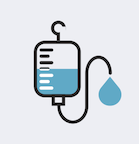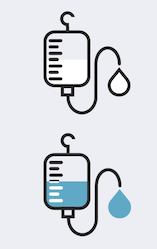
Treatment After CAR T-Cell Therapy for People with Diffuse Large B-Cell or Grade 3B Follicular Lymphoma
What is the purpose of this clinical trial?
This study will test treatment for people with diffuse large B-cell lymphoma (DLBCL) or certain types of follicular lymphoma. These cancers affect B-cells, which are a type of white blood cell that normally helps your body fight infection.
CAR T-cell therapy may be used for these cancers if they come back or do not respond
to other treatments. But sometimes CAR T-cell therapy does not completely get rid of the cancer. This study aims to find out if certain drugs can benefit patients after CAR T-cell therapy. It will test 3 study treatments that use the drugs mosunetuzumab and polatuzumab vedotin.
This trial is set up to find out:
-
If any of the study treatments after CAR T-cell therapy increase the chance of getting rid of all the cancer
-
Which of the study treatments works best after CAR T-cell therapy
-
How safe it is for people with DLBCL or grade 3B follicular lymphoma to receive the study drugs after CAR T-cell therapy
Why is this trial important?
CAR T-cell therapy is a promising treatment for many patients. But doctors want to find treatment that helps more patients completely get rid of lymphoma. Earlier research shows the study drugs may reduce or control DLBCL and follicular lymphoma. This trial is a chance to see if they work against lymphoma that remains after CAR T-cell therapy.
The drug polatuzumab vedotin is approved by the Food and Drug Administration (FDA) for people with DLBCL. Mosunetuzumab has not been approved by the FDA to treat DLBCL or grade 3B follicular lymphoma.
Who can be in this trial?
This trial is for adults, age 18 and older, with diffuse large B-cell lymphoma or grade 3B follicular lymphoma.
This trial may be for people who:
- Will receive CAR T-cell therapy for lymphoma
This trial is not for people who:
- Have CLL (chronic lymphocytic leukemia), SLL (small lymphocytic lymphoma), or mantle cell lymphoma
- Have severe peripheral neuropathy (a type of nerve problem)
- Are pregnant
Talk with your doctor to learn more about who can join this trial.
What treatments will I get?
You will receive CAR T-cell therapy as usual. Then, you will have a PET-CT scan. The results of your scan will determine what happens next for you in the study.
| If the scan shows ... | You will ... |
| The cancer has gotten worse |
|
|
The cancer is gone |
|
|
The cancer is not worse, but there is still cancer in your body |
|
If you join the part of the study that tests drug treatment after CAR T-cell therapy, you will be randomly assigned to one of 4 groups.
|
Group 1: mosunetuzumab |
Group 2: polatuzumab vedotin |
||
|
Group 3: mosunetuzumab |
Group 4: No further treatment (the usual approach) |
If the cancer gets worse without further treatment, you may have the option to join Group 3 and receive the study drugs mosunetuzumab and polatuzumab vedotin. |
Your doctor will not have control over which group you will be assigned to. This helps make sure the study results are fair and reliable.
How long will I be in the trial?
If you receive a study treatment after CAR T-cell therapy, it will take about 6 months to complete treatment.
In total, your part in the study will last 5 years. After treatment, you will have follow-up clinic visits. At these visits, you may have a physical exam, blood tests, and scans.
Are there costs? Will I get paid?
The study drugs, mosunetuzumab and polatuzumab vedotin, are provided free in this study.
You will not be paid for joining the study. Check with your health care provider and insurance provider to find out what costs will and won’t be covered in this study.
Where can I find more information about this trial?
- Talk with your health care provider
- Call the National Cancer Institute at 1-800-4-CANCER
- Go to www.ClinicalTrials.gov and search the national clinical trial number: 05633615


